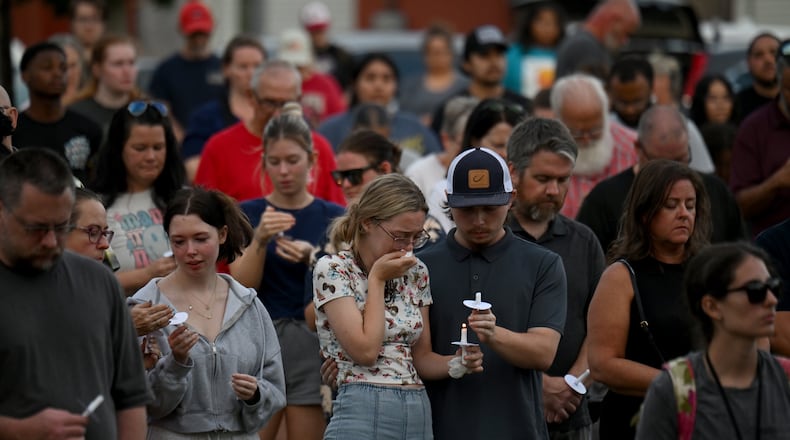Over the past decade, Georgia Republicans have muscled through a series of measures loosening firearms restrictions while more limited bipartisan proposals aimed at deterring gun violence have stalled.
The mass shooting at Apalachee High School in northeast Georgia on Wednesday that left four people dead and a 14-year-old suspect in custody has raised pressure on state political leaders to reassess proposals that have, in some cases, already cleared legislative hurdles with broad support.
The focus has largely narrowed to a handful of measures designed to encourage gun owners to buy lockboxes and other safety mechanisms, bolster school security and assess other initiatives to prevent future tragedies.
While many GOP leaders have sought to avoid taking a firm stance on a policy response to the shooting, saying the attention should be on the grieving Barrow County community, some key Republicans also signaled they’re open to changes when lawmakers reconvene in January.
“You can always make improvements,” said state Sen. Frank Ginn, an influential Republican who represents a slice of Barrow County. “The delicate dance we have to do is make sure we’re not infringing on Second Amendment rights. But there are things we can do to encourage commonsense gun ownership.”
Georgia Democrats haven’t backed off demands for tougher gun regulations that have almost no chance of passing the Republican-controlled Legislature – the debate continued on Thursday – but they have recalibrated their approach to favor scaled-back measures that they say could help prevent some deadly shootings.
“There’s a substantial middle ground here. I don’t know why we tend to ignore the parts where we agree. And we all agree we want to keep our kids safer in schools,” said state Rep. Michelle Au, a Johns Creek Democrat who has helped lead her party’s efforts to limit gun violence.
Credit: Arvin Temkar/AJC
Credit: Arvin Temkar/AJC
The mass shooting on Wednesday only intensified the press to find common ground, with some Republicans acknowledging privately in interviews that they were haunted by the failure to pass seemingly noncontroversial gun measures.
Democratic state Rep. Yasmin Neal, a former police officer, said as much Thursday at a long-scheduled Senate study committee meeting to scrutinize gun safety proposals.
“Democrats and Republicans alike feel like we could have prevented this. There are bills on the table with names from both parties on it,” said Neal, who represents a Jonesboro-based district. “This used to be deeply, deeply partisan, but it’s not anymore.”
‘Redouble our efforts’
A prime example of the legislative consensus and political challenges around the issue is legislation that would waive the sales tax on the purchase of gun safes, trigger locks and other safety mechanisms.
The House and Senate passed similar versions of the legislation this year that would offer gun owners such a tax incentive for purchasing safety equipment, but they failed to reach an accord by the end of the 40-day legislative session. Sponsors are optimistic a bill will pass in 2025, though several say they are still befuddled over why it was waylaid in the Senate earlier this year.
And a Georgia version of a nationwide “Alyssa’s Law” initiative to require public schools to install panic alarms to silently notify law enforcement of threats passed the Senate by a 42-10 vote this year but foundered in the House.
The measure’s GOP sponsor, state Sen. Jason Anavitarte, said the same sort of system helped avert a “much larger tragedy” at Apalachee High School this week.
Credit: Natrice Miller/AJC
Credit: Natrice Miller/AJC
“We must redouble our efforts to pass this legislation in Georgia to ensure this lifesaving technology is in every school,” he said.
Other proposals face a tougher reception under the Gold Dome, including an effort to punish gun owners who allow unsupervised children to access their firearms. Republicans granted that bill a legislative hearing in 2023, but it went no further.
Likewise, proposed “red flag” laws that temporarily take firearms away from gun owners who have been identified as a danger to themselves or others have sputtered for years. Such measures face stiff opposition from conservatives worried about overzealous enforcement.
Brian Robinson, a veteran GOP strategist, said some Republicans see even watered-down gun control measures as “a steppingstone to (gun) confiscation that’s incompatible with the Constitution.”
“At the same time,” Robinson added, “we have to let voters know we’re focused on finding solutions.”
‘I’m tired’
Robinson was a top adviser for then-Gov. Nathan Deal in 2014 when he signed legislation that vastly expanded where Georgians could legally carry firearms.
It triggered a series of expansions, including a 2017 law to roll back gun restrictions on college campuses and a 2022 measure championed by Gov. Brian Kemp that allows more Georgians to carry concealed weapons without a state permit.
Kemp has been noncommittal on the more limited gun safety measures that could reach his desk next year, telling reporters outside the high school late Wednesday that “today is not the day for politics and policy — today is a day for investigation, to mourn these precious Georgians that we have lost.”
Another key policymaker is Lt. Gov. Burt Jones, a likely GOP candidate to succeed the term-limited governor in 2026 who traveled to Barrow County last year to unveil a proposal to pay Georgia teachers to carry weapons in classrooms. This week, he indicated he was open to “all rational ideas that might help solve this problem.”
While some Democrats sounded a confident note about chances of a breakthrough next year, others girded themselves for more gridlock. Democratic state Rep. Shea Roberts of Atlanta is a staunch opponent of firearm expansions who has long pressed, fruitlessly, for “red flag” laws.
“I’m tired of banging my head against the wall on these policies,” Roberts said. “It’s so unfortunate that we have to wait for these tragedies to have these conversations.”
Credit: Jason Getz/AJC
Credit: Jason Getz/AJC
About the Author
Keep Reading
The Latest
Featured






